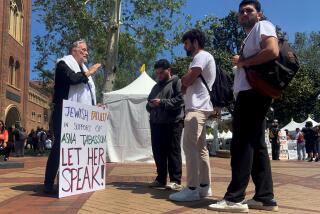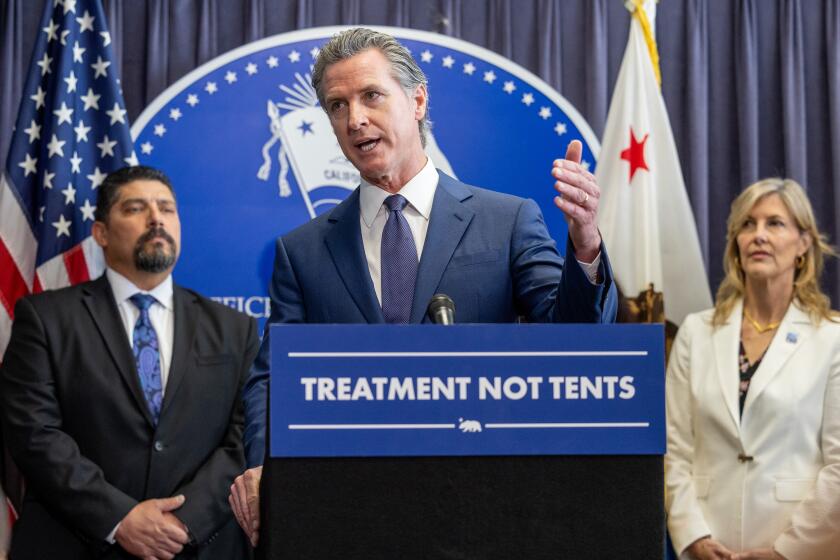L.A. council amends medical marijuana ordinance
The Los Angeles City Council, fearing that it risked a return to the days when medical marijuana dispensaries were opening at an astonishing clip, amended its medical marijuana ordinance Friday to alter key provisions that a judge declared unconstitutional last month.
In a significant change, the ordinance sets up a different process to limit the number of dispensaries. A lottery will choose 100 from among those dispensaries that can prove they were in existence on Sept. 14, 2007, the date the city’s moratorium on new stores took effect.
The changes were forced on the council by the judge’s decision to issue an injunction that barred the city from enforcing parts of the ordinance. On Friday, the city filed notice that it intends to appeal. Los Angeles County Superior Court Judge Anthony J. Mohr has stayed his injunction, but it will take effect if the dispensaries that asked for the ruling are able to post a bond.
Jane Usher, a special assistant city attorney, warned the council that Mohr had made clear that without a new ordinance, his injunction would leave the city with little power to shut down new dispensaries. “He’s put our feet to the fire,” she said. “That is what he’s done.”
The council, with some members voting reluctantly, adopted the revisions on a 12-0 vote, a threshold that could allow the ordinance to become effective within 10 days. Attorneys for dispensaries that sued the city said they expect to post the nearly $350,000 bond soon.
The council settled on 100 dispensaries based on how many it believes the city’s short-handed departments can handle. The original ordinance would have allowed all existing dispensaries that registered under the moratorium to apply to remain open.
An estimated 135 dispensaries followed the city’s rules and are still in business. Those operators have objected strenuously and passionately to a lottery that could eliminate some of the most law-abiding and best-run dispensaries.
“I understand that this is not fair to many of the operators who are doing the right thing,” said Councilman Ed Reyes, but he urged the council to adopt the ordinance to head off another period of lawlessness. “This lottery is what we can do now, as much as it hurts.”
The council’s decision came despite an appeal to slow down and write a better ordinance from former talk-show host Montel Williams, a multiple sclerosis patient who suffers from chronic pain and who has become one of the nation’s most prominent medical marijuana activists.
“Holding feet to the fire? Let me explain something to you. For the last 10 years, from morning til night, 24 hours a day, 365 days a year, I have absolute neuropathic pain through my feet, my shins, my side and my face,” he said, his voice quavering. “You walk in and out of here every day and don’t think about your feet. Mine I have to think about every second of the day.”
He told the council that its ordinance does nothing to ensure the city is choosing the highest-quality operators, noting that the last time he got marijuana in Los Angeles it was tainted with butane. “You’re not solving any problem for patients,” Williams said.
Williams, who met Thursday with some council members, appeared to have influenced several and they treated him with unusual deference. The council voted to consider a plan to create an advisory panel to devise a method to set up an additional 10 dispensaries that would be subject to higher standards.
The amended ordinance is almost certain to draw more legal challenges. Long Beach, which used a lottery to cut the number of its dispensaries to no more than 23, has drawn eight lawsuits.
“We think the lottery is defensible,” said Robert Shannon, the city attorney. He said Long Beach has just started enforcement efforts against losing dispensaries that have refused to shut down.
In Los Angeles, more dispensaries have begun to open, emboldened by the injunction.
“We probably get reports of 10 new ones opening each week,” Usher said.
She said that it takes between six months and two years to shut them down, but that the amended ordinance could help.
“Clarity should lead us to much more success than we had in the second half of last year while we were in litigation,” she said.
More to Read
Start your day right
Sign up for Essential California for news, features and recommendations from the L.A. Times and beyond in your inbox six days a week.
You may occasionally receive promotional content from the Los Angeles Times.






